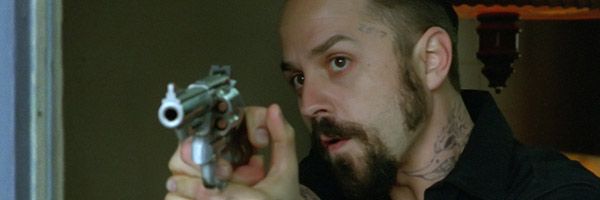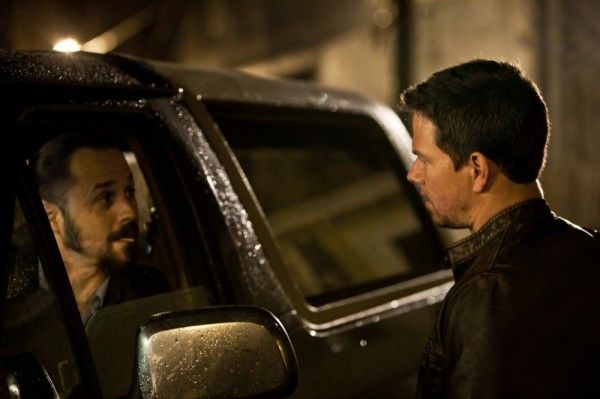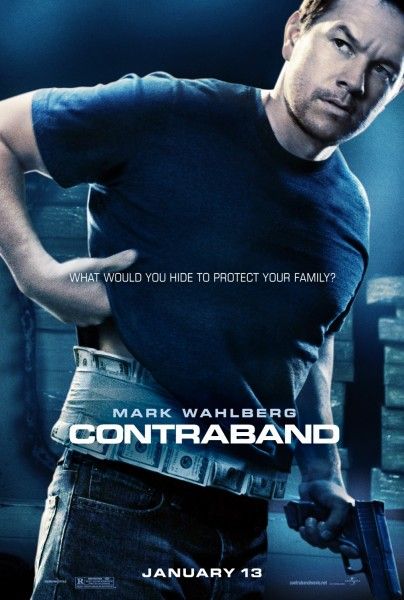Set in New Orleans, Contraband is Mark Whalberg’s new thriller about smuggling on container ships. He plays a blue-collar family man who’s sworn off his former life of crime, until his brother-in-law botches a drug deal and needs his help in order to repay the debt. Whalberg agrees to do one last job, running contraband from Panama on a container ship. Kate Beckinsale plays Whalberg’s wife, Ben Foster his best friend and business partner, and Giovanni Ribisi plays a New Orleans drug runner who is barely recognizable and eerily convincing.
During our one-on-one interview, we talk about how he created the accent, the prison documentaries he watched to get into the role, as well a bit about the upcoming Seth McFarlane movie Ted. Hit the jump for the full interview.
Question: You were amazing in this, completely unrecognizable.
Giovanni Ribisi: Well I had a mammal on my face. A big furry goatee.
I was going to ask… for some reason I thought you grew that out…
Ribisi: No I grew it out… That’s me. I don’t know if I could do a movie with like fake hair… I did that once and it was awful because you can’t move your mouth. Horrible.
Can you talk about your accent, and the origin of that? It’s not just one thing or another.
Ribisi: Yeah, the accent was… Well, New Orleans there’s so many different regions and so many different accents. I think the third ward or the ninth, they talk like they’re from Brooklyn. You know, they talk like this. And then there’s other more refined, the wealthier sections who have more of a southern drawl sorta thing. Not really a drawl, but it’s more of a gentle sort of thing. And then there’s parts that have a combination of that, and then there’s people that speak like they’re from the West Coast. So it was kind of like I wanted to find something that… I think it’s always really important the way people talk. Everyone has a different way of talking, culturally and all that. So this was just something that…I don’t know the voice just seemed to come out, come out of whatever other work was going on.
I’ve heard of actors saying that. That sometimes it’s the internal that informs that external. Sometimes stuff just kind of emerges. Did you work though with a dialect coach at all?
Ribisi: Yeah, Carla Meyer who’s phenomenal and I worked with her before, Just a really great dialect coach. So I worked with her a little bit and you know you have to. But yeah I think that… A lot of it just comes out of a subconscious sort of thing, and I think inspiration—or I don’t know what you call it—I think it’s important to do all the other work, and you have to build a foundation, because at one moment suddenly you start to feel a little more confident. And sometimes that happens towards the end of filming, you don’t know what you’re doing or you don’t feel like you do. But that’s the other thing, working with Batasar, who’s an actor, really you could trust him and he knew what you were going through, and he knew the process and he respected that. He understood, so just this way he was working and psychologically he knew when to push and knew when to let somebody go. So I don’t know, I guess that’s how the voice and the accent came about.
Was it ever hard to keep? Because I know sometimes you’re working on an accent and then it takes a different direction unintentionally. Was that something you had to focus on to stay within the parameters of what you’d crafted?
Ribisi: Yeah I guess so. I don’t even know, I might have been off a couple of times. I know there were points where I was like ‘Oh I gotta do looping on that one…’ But no, I think that sometimes it’s good to watch playback, which they have now on movies which is phenomenal, and go back and listen. I think there was a moment where I had a three way break and I came back and I wanted to just make sure that I was still sort of keyed in to certain things, and it was interesting (laughs) cause I think it was just like one of the fight scenes with Mark and it was after the first take it was like “Ok! We’re back!”
How did you get involved initially in this project? Was this something you read and were immediately attracted to, or did Mark get you on board?
Ribisi: Well it was kind of like the standard fare where I talked to my agent about it and I read the script and I was like ‘Mm…I don’t know.” I think, apparently what Baltasar [Kormákur] was saying was that I was going in for Sebastian [Ben Foster’s role], but I don’t remember that. I remember thinking about Tim Briggs and then going in. He [Baltasar] wanted me to audition and it was kind of awkward, because I said ‘No, I’m not going to audition, but I’ll come in and meet.’ And it wasn’t like an ego thing; I’ll audition for something, but it was like a thing of, you’re not going to get what you need…This [characterization] needs a lot of work, and you’re not going to see what it is, so it’s just kind of pointless, an exercise in futility really. And so I remember I went into the room and they knew that, but they still had somebody bring out…And I was like (laughs) ‘what are you doing.’ So then I went in and talked to them and I said, ‘Look…I apologize, but I can’t do this, you know. I think I can do this.’ In the back of my mind being like…Oh gosh, well I don’t know...(laughs). It’s just about being committed, and you’re an actor. So then he [Baltasar] trusted me and we got involved and we started working on it and then ultimately I feel like it was a very healthy collaboration. It was something that I really enjoyed, because he’s an actor and because we have, I think, similar ideas about things.
Do you feel generally that you are someone who likes to collaborate with directors, to help them achieve their vision, but also be like “Hey, this is how I see it also, let’s talk this through” Do you do that, or do you follow the director’s lead?
Ribisi: I’m definitely one of those people that what comes into my head falls out of my mouth. And I warn people about that before I work with them, and I say ‘Look, I don’t have an ego, but you know your vision is important and I want to support that, and sometimes I talk and say things…And so yes, I want to contribute and sometimes that’s a way for me to be even more creative, to sort of get the ball rolling and start parlaying off of somebody and interacting. That charge or that friction sometimes—if it’s positive or negative—is inspiring, and it gets people to be I think creative, maybe.
The film is pretty violent and gritty. Is there ever a point when you have to think ‘Is the character going too far, is he redeemable, what makes him cross the line of going full-throttle evil?’
Ribisi: No, I don’t think he is. I think he has a kid and I think he’s an individual just like everybody else, but I wasn’t thinking about him being redeemable. I think that I wanted to be effective, and you want to do things—I want to do things that are indelible, and redeemabl—you forget about that. It’s like ‘Oh, he’s redeemed.’ And I know what you’re saying.
I feel like I want to rephrase that. I more mean, how do you avoid the trap of making him redeemable? Are you able to go full-throttle? Do you just kind of have to let it go and work with Kate beforehand and establish that trust?
Ribisi: Yeah, I mean we worked it out a lot beforehand. The stuff with Mark—Mark really has a lot of experience [with fight scenes] and knows what he’s doing in that way and you can trust him. But with Kate, you know there were definitely two scenes that were really hard, and it was difficult for me, and I hated it at times before. I would think to myself ‘Oh god..this is horrible.’ And it was so unbelievably uncomfortable, but you knew that it had to be—on a character and storytelling level—he’s the boogeyman. There is a part of him that is that, and so I just felt like…I don’t know… it’s hard you just kind of have to do it, and not question it. That was the other thing, there’s no way to play this part, I think, by being tepid, or by apologizing, or by saying ‘I’m not really doing it!’ You have to really….
Throw your personal self out of the equation…
Ribisi: Or throw yourself into it more and more and more.
I know you spoke in the press conference about watching documentaries about people in prison. Did that inform more of the physical stuff, or was that just getting into the psyche of the character? What sort of stuff did you watch?
Ribisi: I watched a really great documentary; it was on Danny Trejo. He’s phenomenal. There’s a documentary about him, and he talks a lot about—from an actor’s perspective, as well—the psychology of prison and what that’s like, and him living and having the prison lifestyle, and that was really helpful. And then there was a lot of TV shows, a lot of documentary TV shows, and you know, you live in a cloistered life—not you, but somebody does—and you’re just like ‘Oh my god…this exists, and this is life. And you’re just like holy shit.’ Even just the recognition of it in the beginning, and then it becomes this thing where you start to try different things, and you start to imitate or whatever, and hopefully that starts to become more and more of your own sort of daily routine and your processes.
I think it’s interesting because physically, and taking place in New Orleans, it’s not your typical thug drug dealer character. Makes it more of an interesting role. It’s not so typical. I want to ask you quickly about Ted and what it was like working on that.
Ribisi: It was surreal!
Did you guys improvise a lot on set?
Ribisi: Well, a little bit. Before you never used to be able to do that, and I don’t know even on Roger Rabbit—what that was sort of like the beginning of that animation interacting with real people. Well I guess not, you have those older Disney movies. But Roger Rabbit was like a technological [makes whizzing noise…]. And this was because Seth McFarlane was playing Ted, and he’s the voice and he had like the CGI—the mocap suit [motion capture suit] on, and he’d by like ‘Hey, hey!’ doing the thing (laughs). You were able to improvise a little bit. But also his writing is so genius and so funny…I mean I don’t know how you can do better than that.
Who do you play in it?
Ribisi: I play Donny, the stalker, the guy who’s obsessed with the talking teddy bear and has been ever since he was a star in the 1970s or early ’80s. Apparently Mark is supposed to see it soon…I don’t know if it’s a completely finished teddy bear, but I think that it’s close. He’s supposed to see an edited version of it.
Contraband opens this weekend



